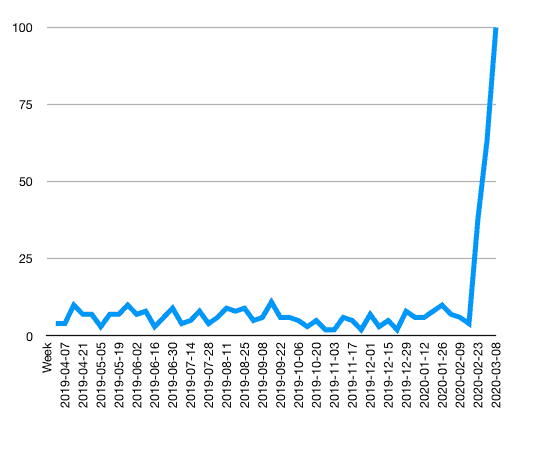How will Coronavirus Affect my Travel Insurance?
Last modified:As Coronavirus locks down travel worldwide, we assess the damage to the UK travel insurance industry.
Since the outbreak of COVID-19, travel insurance providers have been reacting to record levels of claims, unparalleled disruption to claims centres and a dramatic fall in business as international travel restrictions and grounded airlines effectively put an end to tourism and non-essential travel of any kind.
Fig 1. Search trends for “cancel travel insurance” in the UK over the past 12 months

Exceptional Travel Advisory Notice
The UK government’s COVID-19 Exceptional Travel Advisory Notice advises British people against non-essential travel worldwide. As thousands of British citizens had travel plans cancelled or found themselves stranded abroad in the midst of a global pandemic, the chart above indicates how UK insurers were immediately faced with a massive spike in travel insurance cancellations whilst claims against travel insurance policies peaked.
Significantly, the majority of travel insurance policies will cease to offer any cover whilst The Foreign and Commonwealth Office (FCO) advice is in place. Currently the FCO is advising people against all non-essential travel for a minimum of 30 days.
Updates to the FCO’s advice with regards to travel can be found here: www.gov.uk/foreign-travel-advice
Will Travel Insurance Claims Push-up Insurance Prices?

As insurers struggle under the weight of travel insurance claims there’s the probability that other insurance products will see an increase in premiums as insurers attempt to stabilise cash flow.
Insurance companies, like most businesses, are also facing huge challenges with regards to logistics. As the nation is told to avoid social contact and work from home, call centres are being hit especially hard. Disruption on this scale could also be an indicator of potential price rises. However, any potential price rise could be counter-balanced by the need for insurers to minimise the damage caused by a national lack of confidence in the industry as a whole.







